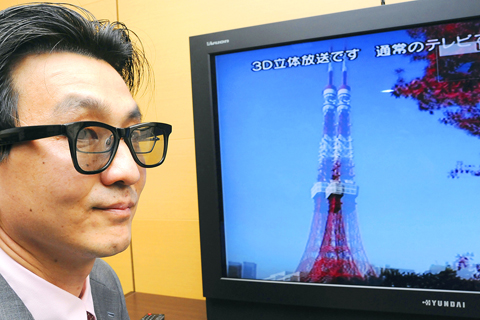Badminton matches look so real playing on Hyundai’s new 3D TV that you may reflexively dodge the shuttlecock. A polar bear pawing the glass of his tank may seem to be inside the TV pushing on the screen.
Hyundai is offering — in Japan only — the first product for watching the 3D programs that cable stations in Japan now broadcast about four times a day.
PRICEY HOBBY

PHOTO: AP
There are, however, a few catches.
The 46-inch liquid-crystal display requires 3D glasses; it’s expensive — US$3,960, including two pairs of glasses, or about 25 percent more than a comparable regular LCD TV; and the only programs available so far include just a few minutes of video from Japan’s northern island of Hokkaido — shots from the zoo, motorcycle-races and other short scenes.
PLAIN OLD TV
Seen on regular TVs, 3D programs split the screen vertically so the same image appears in both the left and right halves.
Conversely, wearing the 3D glasses while watching regular programming on the Hyundai 3D TV produces a slight 3D effect.
The TV uses stereoscopic technology called TriDef from DDD Group Plc in Santa Monica, California, which works by sending the same image separately for the left eye and the right eye.
Ryo Saito of BS 11, the cable channel that runs the 3D shows, says more content is needed for the technology to catch on, and other manufacturers need to start making 3D televisions.
“People are showing interest in 3D programs, but most homes don’t have the special TVs,” he said.
SAMSUNG
Samsung already sells 3D rear projection TVs in the US, but there are no 3D TV broadcasts in the US. The technology is also available on desktop monitors and for video games.
Hyundai IT is hoping to boost its image by gaining a niche audience in Japan, where the TV market is dominated by Sony Corp and Sharp Corp. The South Korean electronics maker’s 3D TV went on sale in April, but unit sales numbers weren’t available.
There is no plan to sell the TV overseas, Hyundai Japan senior manager Kim Pyeng-joong said.

PEACE AND STABILITY: Maintaining the cross-strait ‘status quo’ has long been the government’s position, the Ministry of Foreign Affairs said Taiwan is committed to maintaining the cross-strait “status quo” and seeks no escalation of tensions, the Ministry of Foreign Affairs (MOFA) said yesterday, rebutting a Time magazine opinion piece that described President William Lai (賴清德) as a “reckless leader.” The article, titled “The US Must Beware of Taiwan’s Reckless Leader,” was written by Lyle Goldstein, director of the Asia Program at the Washington-based Defense Priorities think tank. Goldstein wrote that Taiwan is “the world’s most dangerous flashpoint” amid ongoing conflicts in the Middle East and Russia’s invasion of Ukraine. He said that the situation in the Taiwan Strait has become less stable

Japanese Prime Minister Sanae Takaichi yesterday lavished US President Donald Trump with praise and vows of a “golden age” of ties on his visit to Tokyo, before inking a deal with Washington aimed at securing critical minerals. Takaichi — Japan’s first female prime minister — pulled out all the stops for Trump in her opening test on the international stage and even announced that she would nominate him for a Nobel Peace Prize, the White House said. Trump has become increasingly focused on the Nobel since his return to power in January and claims to have ended several conflicts around the world,

REASSURANCE: The US said Taiwan’s interests would not be harmed during the talk and that it remains steadfast in its support for the nation, the foreign minister said US President Donald Trump on Friday said he would bring up Taiwan with Chinese President Xi Jinping (習近平) during a meeting on the sidelines of the APEC Summit in South Korea this week. “I will be talking about Taiwan [with Xi],” Trump told reporters before he departed for his trip to Asia, adding that he had “a lot of respect for Taiwan.” “We have a lot to talk about with President Xi, and he has a lot to talk about with us. I think we’ll have a good meeting,” Trump said. Taiwan has long been a contentious issue between the US and China.

UKRAINE, NVIDIA: The US leader said the subject of Russia’s war had come up ‘very strongly,’ while Jenson Huang was hoping that the conversation was good Chinese President Xi Jinping (習近平) and US President Donald Trump had differing takes following their meeting in Busan, South Korea, yesterday. Xi said that the two sides should complete follow-up work as soon as possible to deliver tangible results that would provide “peace of mind” to China, the US and the rest of the world, while Trump hailed the “great success” of the talks. The two discussed trade, including a deal to reduce tariffs slapped on China for its role in the fentanyl trade, as well as cooperation in ending the war in Ukraine, among other issues, but they did not mention